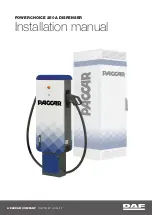
pressure telltale when one or more of your
tires is significantly under-inflated. Accord‐
ingly, when the low tire pressure telltale illu‐
minates, you should stop and check your
tires as soon as possible, and inflate them to
the proper pressure. Driving on a signifi‐
cantly under-inflated tire causes the tire to
overheat and can lead to tire failure. Under-
inflation also reduces fuel efficiency and tire
tread life, and may affect the vehicle's han‐
dling and stopping ability. Please note that
the TPMS is not a substitute for proper tire
maintenance, and it is the driver's responsi‐
bility to maintain correct tire pressure, even
if under-inflation has not reached the level to
trigger illumination of the TPMS low tire pres‐
sure telltale.
Your vehicle has also been equipped with a
TPMS malfunction indicator to indicate that
the system is not operating properly. The
TPMS malfunction indicator is combined with
the low tire pressure telltale. When the sys‐
tem detects a malfunction, the indicator
lamp will flash for approximately one minute
and then remain continuously illuminated.
This sequence will continue upon subsequent
vehicle start-ups as long as the malfunction
exists.
When the malfunction indicator is illumina‐
ted, the system may not be able to detect or
signal low tire pressure as intended. TPMS
malfunctions may occur for a variety of rea‐
sons, including the installation of replace‐
ment or alternate tires or wheels on the vehi‐
cle that prevent the TPMS from functioning
properly.
Always check the TPMS malfunction telltale
after replacing one or more tires or wheels
on your vehicle to ensure that the replace‐
ment or alternate tires and wheels allow the
TPMS to continue to function properly.
The system checks the tire pressure and the tire
temperature of the tires installed to the vehicle
by means of a tire pressure sensor.
The tire pressure and the tire temperature
appear in the multifunction display
(
/
page 311).
If there is a substantial pressure loss or if the
tire temperature is excessive, you will be warned
in the following ways:
R
via display messages (
/
page 391)
R
via the
h
warning lamp in the instrument
cluster (
/
page 410)
The tire pressure monitoring system is only an
aid. It is the driver's responsibility to set the tire
pressure to the recommended cold tire pressure
suitable for the operating situation.
In most cases, the tire pressure monitoring sys‐
tem will automatically update the new reference
values after you have changed the tire pressure.
You can, however, also update the reference val‐
ues by restarting the tire pressure monitoring
system manually (
/
page 311).
System limits
The system may be impaired or may not function
in the following situations:
R
the tire pressure has been set incorrectly
R
there is a sudden pressure loss caused, for
example, by a foreign object penetrating the
tire
310 Wheels and tires
Summary of Contents for GLB 2021 Series
Page 8: ...Left hand drive vehicles 6 At a glance Cockpit...
Page 10: ...R Opens the hood 271 S Electric parking brake 168 T Light switch 125 8 At a glance Cockpit...
Page 11: ......
Page 12: ...Instrument Display standard 10 At a glance Indicator and warning lamps standard...
Page 16: ...14 At a glance Overhead control panel...
Page 18: ...16 At a glance Door control panel and seat adjustment...
Page 20: ...18 At a glance Emergencies and breakdowns...
Page 351: ...Model Maximum gra dient climbing ability All models Technical data 349...
Page 445: ......
Page 446: ......
















































